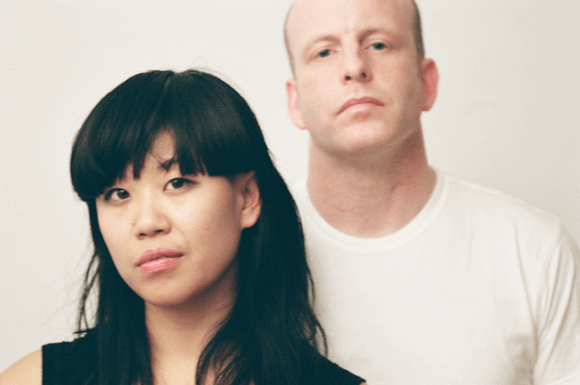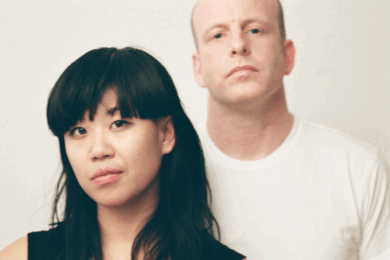It would probably be an overstatement to say the story of John Maclean was one of redemption or deliverance, but it is true that the New Yorker has faced a demon or two on his way to producing the dance album of the year so far in The Future Will Come (out now on DFA records) using the curious moniker, The Juan Maclean. MacLean has waded through a drug addiction that took him almost to the point of irrevocable destruction; the dissolution of a band beset by tragedy; and eventually a profound apathy towards the plasticity of the scenes he found himself in that made him give up music altogether. While averting total disaster, that’s a lot of spanners in the works.
And as with most stories of a man returning to life after visiting the cliffs of the abyss, there is a woman involved. The Future Will Come would be close to nothing without LCD Soundsystem vocalist Nancy Whang, whose interchange with Maclean’s strange brand of camp baritone is a particular high-point on a record that, while offering a back-to-basics take on disco, is not without its more throbbing moments of pure house, like the club anthem that preceded the release of this record (and concludes it), ‘Happy House’.
He met Whang through LCD’s James Murphy, a friend who he has known since 1990. Murphy and Maclean share the same approach to dance music that human beings do a better job of making music than computers, and that this style can be enjoyed not only by the fuzzy-minded clubber who has popped a few, but the casual listener at home too.
Maclean’s first album, Less Than Human, came out in 2005 and was an imperfect collection of less melodic and less focussed electronic experimenting from this newly-converted robotnik, who in his first band, the troubled Six Finger Satellite, played a heavy post-punk back in his days in Providence, Rhode Island during the 90s.
His first of what will probably be a couple of stints in Europe in 2009 yielded an appearance at the Ether Festival on the South Bank in the incongruous surrounds of the Queen Elizabeth Hall, a date in Zurich where they sold just 25 tickets and inevitably, a night among the Kings and Queens of recherché London with White Heat at Madame JoJo’s. It is the morning after.
Hi John. How was last night’s show?
John MacLean: "Great. It was probably the best show so far. I always think of London audiences as being the most cynical, but everyone was really enthusiastic."
Do you acknowledge a certain European influence on your music, what with the Italo and Eurodisco element to your sound?
JM: "Definitely, which is why it’s much better for us coming over here to tour than the US, because people tend to be better informed with this sort of music. America embracing dance music on any kind of level is a very recent development; historically, American audiences tend to be very separate. If someone liked rock music they only liked rock music and would never go to a club with a DJ playing, and if someone was into dance they would never go see a band play. In Europe and the UK it’s always been that people can be into both things at the same time."
To what extent did becoming a regular live act affect your approach to The Future Will Come?
JM: "With my first album, I made the entire thing on my own in my home studio, and I didn’t even know I was making an album. I was just making a series of tracks and 12"s that were later compiled as an album. It didn’t occur to me to have a live band until after the album was done, and I had to reconsider the songs for the live band. With this album I actually brought the live band into the studio and that’s a big reason this record sounds different. There’s something about playing parts live and having an actual person playing keyboard parts all the way through that makes something sound much different to using loops or programming. I like that sound but it’s more robotic and locked-down, as opposed to the live feel of this album."
I guess that means that when it came to actually play the new album live you got pretty close to the recorded versions.
JM: "Yeah. For Less Than Human we were almost totally re-writing the songs so a live band could play them. Now we’re able to faithfully execute songs the way they are on the album without a problem."
What motivated you to revisit the male and female call-and-response style of vocals?
JM: "Before I made the album I knew I wanted it to be more vocal-oriented, and I wanted to keep having Nancy sing on things. I wasn’t really interested in someone being perceived as a ‘guest vocalist’. Nancy’s role in LCD Soundsystem is minimal, she plays keyboard and does back-up vocals and I knew she was itching to do something more full-time. So we talked about her being a full-time presence on the record as opposed to a guest vocalist and we started writing these duets with back and forth vocals, which led into the obvious reference to The Human League."
One record that I think is comparable with yours in recent times was Kelley Polar’s I Need You To Hold On While The Sky Is Falling, which combines that disco hedonism with a certain innocence. Do you think a similar innocence is prominent on your record?
JM: "I think so, and a sort of sincerity you don’t often find in electronic music. It’s easy for people to hide behind a lot of irony, and in dance music lyrics tend to be about meaningless, going-out-on-the-town kind of things. So the innocence comes in a naïve approach where we just wanted to write sincerely about things in an honest way."
This is the most pop you have ever been. What moved you to leave instrumental, more pure dance stuff behind?
JM: "For The Future Will Come I sat down from the beginning to write an album. It’s just more interesting for me to work that way and makes for a more interesting listen at home, outside of the club. And I reserve the big dancey things for 12"s, although there is still that sort of thing on there like ‘The Simple Life’ or ‘Happy House’."
So you try and separate yet strike a balance between music for clubs and music to genuinely listen to?
JM: "Yeah, for sure. I try and reserve 12"s for epic 8-10 minute tracks, but I do think it’s interesting to break up an album with those sorts of things. I think it makes them sound more powerful when they are book-ended with shorter, poppier things."
Was it not ever tempting to do a full album of house after the success of ‘Happy House’?
JM: "A whole album of longer instrumentally oriented dance tracks just gets kind of boring. I think that when people do that it never works out very well. People who have made my favourite 12"s just generally make consistently brilliant 12"s. When they sit down to make an album they end up failing fairly miserably, even if all the tracks on their own sound good."
What are the main similarities between you and James Murphy as musicians?
JM: "James and I both come from a punk and indie background, we grew up together playing loud, bombastic rock music. Making the switch over to electronic music, I felt we both carried the production values from rock into the dance music world. Historically in lots of dance music you would use a lot of two-bar loops that were programmed, whereas we would use live instrumentation in the studio. That was a really big part of forming the DFA sound."
In what ways has he been important to you in your career thus far?
JM: "James was the live engineer for Six Finger Satellite for years. When I quit them I was so disenchanted with being in a band and making music in general that I didn’t think I would make music again. James was the one who convinced me to start doing it again after I’d taken a few years off. I don’t think I would be here at this point if it wasn’t for him. And I always end up finishing everything I do with him. It’s always me and him in the final stages of mixing a track or an album."
DFA prides itself on the fact it built for longevity. What else sets it aside?
JM: "DFA works very slowly. We only put out records that we think are the absolute best thing at the time that we can do – there is a filter. And it’s so intense that we tend to go long periods between releases because we’re scrutinizing everything so carefully. It’s made people really trust the label."
How big a factor was your drug problem in your quitting music?
JM: "That was actually earlier on. That was the big thing in Six Finger Satellite and it ruined a lot of stuff. Our first bass player [Kurt Neimand] died of a heroin overdose. Drugs didn’t have much to do with me dropping out of music. The main reason for me quitting drugs was that I couldn’t make music anymore."
Was it a case that drugs and music went too hand-in-hand and you couldn’t divorce the two?
JM: "Yes, but in a kind of opposite way where I knew that I couldn’t live that way anymore and make music. It was a choice of one or the other."
How did your band and the musicians around you help you through that time?
JM: "By eventually having nothing to do with me! On tour once with Six Finger Satellite I was dropped off at home and my clothes thrown out of the van, they never wanted to see me again. Drugs made things like touring or just being around people in general almost impossible."
So the time you took away from music before returning in the early 00s was down to disillusionment with the industry rather than your addiction.
JM: "Certainly, specifically the whole indie rock scene. It had become very collegiate in the United States. It had gone from being this experimental kind of thing with people making very interesting music, to there being this specific indie sound and people dressing in a certain way. Being in an indie band was like being the popular kids at school. The reasons why I had got into that music in the first place had gone full circle."
How did that time out affect your attitude to music when you came back to music, albeit the dance variety?
JM: "It just seemed exciting all over again because it was all untapped territory for me. I was able to approach it with the innocence of being able to discover all this new music and be excited about it again."



